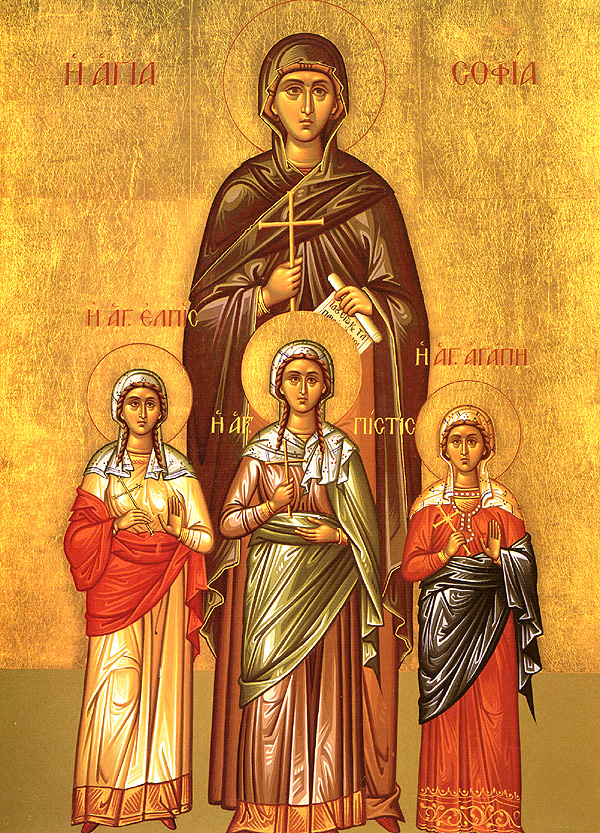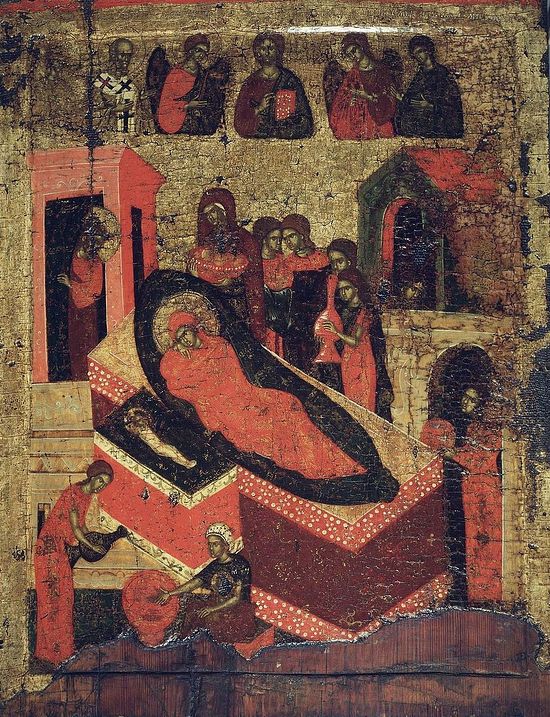The Conception of St. John the Baptist
The Conception of the Venerable Prophet, Forerunner and Baptist of the Lord, John: The holy Prophet Malachi prophesied that before the Messiah's birth His Forerunner would appear, and would indicate His coming. The Jews therefore in awaiting the Messiah also awaited the appearance of His Forerunner. In a city of the hills of Judea in the land of Palestine lived the righteous priest St Zachariah and his wife St Elizabeth, zealously observing the commandments of the Lord. The couple, however, had a misfortune: they remained childless in their old age, and they prayed unceasingly to God to grant them a child. Once, when St Zachariah took his turn as priest at the Temple of Jerusalem, he went into the Sanctuary to offer incense. Going behind the veil of the Sanctuary, he beheld an angel of God standing at the right side of the altar of incense. St Zachariah was astonished and halted in fear, but the angel said to him, "Fear not, Zachariah, for your prayer is heard; and your wife Elizabeth will bear you a son, and you shall call his name John." But Zachariah did not believe the words of the heavenly messenger, and then the angel said to him, "I am Gabriel, who stand in the presence of God; and I was sent to speak to you, and to bring you the good news. Behold, you will be silent and unable to speak until the day that these things come to pass, because you did not believe my words...." Meanwhile, the people were waiting for Zachariah and they were astonished that he had not come out from the Sanctuary after so long a time. And when he did come out, he was supposed to pronounce a blessing upon the people, but could not do so because he had been struck speechless. When Zachariah explained by gestures that he was unable to speak, the people then understood that he had experienced a vision. The prophecy of the Archangel was fulfilled, and Righteous Elizabeth was delivered from her barrenness, and gave birth to John, the Forerunner and Baptist of the Lord.
Sixteen Sunday after Pentecost
From the Explanation of the Gospel Matthew 25: 20-30of St. by Blessed Theophylact, Archbishop of Ochrid
20-30. And so he that had received five talents came and brought another five talents, saying, Lord, thou deliveredst unto me five talents: behold, I have gained besides them five talents more. His lord said unto him, Well done, thou good and faithful servant: thou hast been faithful over a few things, I will make thee ruler over many things: enter thou into the joy of thy Lord. He also that had received two talents came and said, Lord, thou deliveredst unto me two talents: behold, I have gained two other talents beside them. His lord said unto him, Well done, good and faithful servant; thou hast been faithful over a few things, I will make thee ruler over many things: enter thou into the joy of thy lord. Then he which had received the one talent came and said, Lord, I knew that thou art a hard man, reaping where thou hast not sown, and gathering where thou hast not strewn; and I was afraid, and went and hid thy talent in the earth: lo, there thou hast that is thine. His lord answered and said unto him, Thou wicked and slothful servant, thou knewest that I reap where I sowed not, and gather where I have not strewn: thou oughtest therefore to have put my money with the bankers, and then at my coming I should have received mine own with increase. Take therefore the talent from him, and give it unto him which hath ten talents. For unto every one that hath shall be given, and he shall have in abundance: but from him that hath not shall be taken away even that which he hath. And cast ye the unprofitable servant into outer darkness: there shall be weeping and gnashing of teeth.
Both of those who had worked and traded with the talents given to them are praised equally by the master, each one hearing, Well done, thou good and faithful servant. Good we understand here to mean "loving all mankind" and "without spite," he who imparts his own goodness to his neighbors. Those who have shown themselves to be faithful over a few things are made rulers over many things. But even if we are deemed worthy of gifts in this life, that is nothing in comparison to the good things that are to come.
Martyr Sophia and her three daughters at Rome
 The Holy Martyrs Saint Sophia and her Daughters Faith, Hope and Love were born in Italy. Their mother was a pious Christian widow who named her daughters for the three Christian virtues. Faith was twelve, Hope was ten, and Love was nine. Saint Sophia raised them in the love of the Lord Jesus Christ. Saint Sophia and her daughters did not hide their faith in Christ, but openly confessed it before everyone.
The Holy Martyrs Saint Sophia and her Daughters Faith, Hope and Love were born in Italy. Their mother was a pious Christian widow who named her daughters for the three Christian virtues. Faith was twelve, Hope was ten, and Love was nine. Saint Sophia raised them in the love of the Lord Jesus Christ. Saint Sophia and her daughters did not hide their faith in Christ, but openly confessed it before everyone.
An official named Antiochus denounced them to the emperor Hadrian (117-138), who ordered that they be brought to Rome. Realizing that they would be taken before the emperor, the holy virgins prayed fervently to the Lord Jesus Christ, asking that He give them the strength not to fear torture and death. When the holy virgins and their mother came before the emperor, everyone present was amazed at their composure. They looked as though they had been brought to some happy festival, rather than to torture. Summoning each of the sisters in turn, Hadrian urged them to offer sacrifice to the goddess Artemis. The young girls remained unyielding.
Fifteen Sunday after Pentecost
From the Explanation of the Gospel Matthew 22: 35-46 of St. by Blessed Theophylact, Archbishop of Ochrid
34-40. But when the Pharisees had heard that He had put the Sadducees to silence, they were gathered together. Then one of them, which was a lawyer, asked Him a question, testing Him, and saying, Master, which is the great commandment in the law? Jesus said unto him, Thou shalt love the Lord thy God with all thy heart, and with all thy soul, and with all thy mind. This is the first and great commandment. And the second is like unto it, Thou shalt love thy neighbour as thyself. On these two commandments hang all the law and the prophets. Out of immeasurable spite this man comes forward to put the Lord to the test.
For when they saw the Sadducees put to shame and the Lord praised for His wisdom, they came forward to test Him to see if He would add something to the first commandment, and thus give them the chance to accuse Him of being an innovator who corrects the law. But the Lord discloses their malice, and because they came not to learn, but rather, devoid of love, to show their envy and their spite, He reveals to them the exceedingly great love expressed by the commandments. And He teaches that we ought not to love God partially, but to give all of ourselves to God. For we perceive these three distinctions of the human soul: the vegetative, the animal, and the rational. When the soul grows and is nourished and begets what is like unto it, it resembles the plants; when it experiences anger or desire, it is like the animals; when it understands, it is called rational. See, then, how these three facets are indicated here. Thou shalt love thy God with all thy heart—this is the animal part of a man; and with all thy soul (or life)—this is the vegetative part of a man, for plants are alive and animate; and with all thy mind—this is the rational. So one must love God with all one's soul, that is, attend to Him with all the parts and powers of one's soul. This is the first and great commandment, training us in piety. The second is like unto it, exhorting us to do to other men what is just and right. For there are two things which lead to perdition, evil doctrines and a corrupt life. Lest we fall into unholy doctrines, we must love God; so that we do not lead a corrupt life, we must love our neighbor (see Levit. 19:18). For he who loves his neighbor fulfills all the commandments, and he who fulfills all the commandments, loves God.So by means of each other these two commandments are welded together and united, containing within themselves all the other commandments. Who is it that loves God and his neighbor, but also steals, or bears grudges, or commits adultery, or murders, or fornicates? This lawyer, then, at the onset came to test Him but then, hearing Christ's answer, he amended his ways, and the Lord praised him, as Mark also says that Jesus looked at him with love, and said, Thou art not far from the kingdom of heaven (Mk. 12:34).
Sermon for the Nativity of the Theotokos
 How common it is for us to celebrate the birth and milestones in the life of our friends and those whom we hold dear. We enjoy celebrating their birthday and achievements expressing our camaraderie in their triumphs along their life’s journey, rejoicing when they rejoice. Is this not even more natural for us to do within the Church? There are many saints whom we are drawn to (or, more correctly, they draw us to themselves) and we, therefore, make a point to be aware of the day that their feast is celebrated, take time out to read their life and works, prepare and commune at the Divine Liturgy and honour them recognizing their place in the wider Church as well as in our own lives. Therefore, today is no different, and yet it is, due to the greatness of the one we are celebrating: Mary, the Mother of God.
How common it is for us to celebrate the birth and milestones in the life of our friends and those whom we hold dear. We enjoy celebrating their birthday and achievements expressing our camaraderie in their triumphs along their life’s journey, rejoicing when they rejoice. Is this not even more natural for us to do within the Church? There are many saints whom we are drawn to (or, more correctly, they draw us to themselves) and we, therefore, make a point to be aware of the day that their feast is celebrated, take time out to read their life and works, prepare and commune at the Divine Liturgy and honour them recognizing their place in the wider Church as well as in our own lives. Therefore, today is no different, and yet it is, due to the greatness of the one we are celebrating: Mary, the Mother of God.






